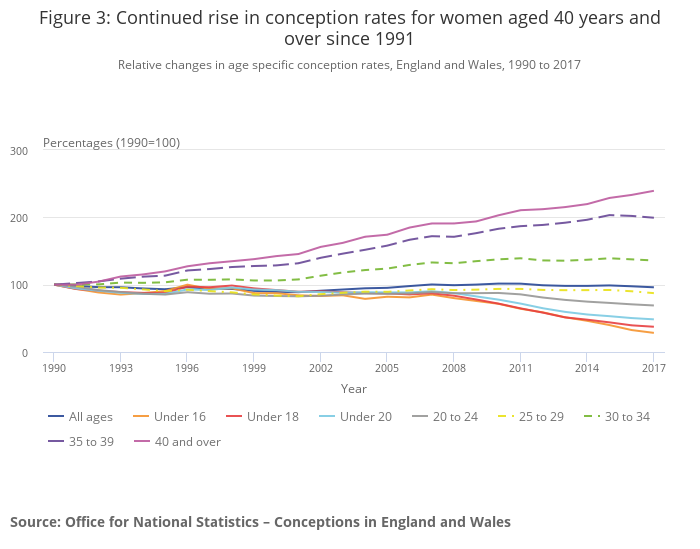The number of women getting pregnant in their 40s is on the rise
Newly released data shows that conception rates increased by 2.6% for women aged 40 years and over between 2016 and 2017. For the second year running, women aged 40 and over were the only age group to see this increase. Nearly 29,000 women aged 40 and over conceived in 2017, compared to just 14,739 in 1997.
The conception rate for this age group has more than doubled since 1990.
The data was published by the Office for National Statistics (ONS) and covers England and Wales in 2017 – the most recent year that figures are available.

Overall the number of pregnancies is falling in England and Wales, but older women are the only age group that has seen an increase.
In 2017, there were an estimated 847,204 conceptions, which was a decrease of 1.8% from the previous year – the largest decrease since 2012. The figures also show that more women are getting pregnant in their 30's than in their 20's for the first time since age-specific data was recorded in 1990.
Kathryn Littleboy, senior research officer from the ONS’s vital statistics output branch, believed the reason for this was due to ‘the rising costs of childbearing and housing, among other reasons’.
In contrast to rising rates in women over 40, conception rates for women aged under 18 in England and Wales decreased for the tenth year running in 2017.
The estimated number of conceptions to women aged under 16 years fell to 2,517 in 2017, compared with 2,821 in 2016, which is a decrease of 10.8%.
Possible reasons for the continued decrease in teenage conception rates include improved sex and relationship education, better access to contraceptives and increased participation in higher education.
Further information
Read more pregnancy news
-
Read more about '11 Best Pregnancy and Parenting books as voted by you! 'Being pregnant blogs
11 Best Pregnancy and Parenting books as voted by you!
-
Read more about 'What is continuity of carer? 'Being pregnant blogs
What is continuity of carer?
-
Read more about 'Pregnant after IVF - Ellie's story 'Being pregnant blogs
Pregnant after IVF - Ellie's story
-
Read more about 'Eating fruit in pregnancy shown to affect brain development 'Being pregnant blogs
Eating fruit in pregnancy shown to affect brain development
-
Read more about ''Our baby was too small. Our baby would need to be born early. Our baby was not coping inside of me.' 'Being pregnant blogs
'Our baby was too small. Our baby would need to be born early. Our baby was not coping inside of me.'
